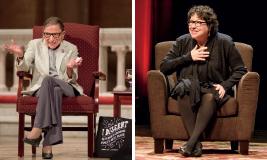Justices Ginsburg and Sotomayor Visit SLS
This year, Stanford hosted visits from two members of the U.S. Supreme Court: Justice Ruth Bader Ginsburg in February and Justice Sonia Sotomayor in March. • On February 6, Justice Ginsburg returned to Stanford, her second visit in four years, to deliver the university’s “Rathbun Lecture on a Meaningful Life.” • “If you want to be a true professional, you will do something outside yourself,” Ginsburg told the packed audience at Memorial Church. “Something to repair tears in your community. Something to make life a little better for people less fortunate than you. That’s what I think a meaningful life is—living not for oneself, but for one’s community.” • Ginsburg also emphasized the importance of collegiality at the Court. • “When a justice is of the firm view that the majority got it wrong, she is free to say so in dissent,” Ginsburg said. “I take advantage of that prerogative, when I think it’s important, as do my colleagues. Despite our strong disagreements on cardinal issues—think, for example, of controls on political campaign spending, access to the ballot, affirmative action, access to abortion, same-sex marriage—we genuinely respect one another, even enjoy one another’s company. Collegiality is crucial to the success of our mission.”
On March 10, Justice Sotomayor spent the first part of her visit to campus meeting in small groups with law students and faculty, before speaking to a capacity crowd at Memorial Auditorium. Elena Rodríguez Armenta, JD ’18, one of 25 Stanford Law student leaders who met with Sotomayor, described it as “beyond inspiring.”

Associate Justice Sonia Sotomayor
Photo by Linda A. Cicero
M. Elizabeth Magill, Richard E. Lang Professor of Law and Dean, interviewed the justice at Memorial Auditorium, saying, “Her wisdom and warmth created a unique and memorable experience, one I know this community will long remember.”
Sotomayor spoke about her role on the U.S. Supreme Court and how her professional background shapes her work as an associate justice. “I’m known for asking a lot of questions about the record in the case. I think that is very much a product of my extensive trial experience and the fact that I was a trial judge. As a result of that experience, I believe that the law should be incrementally grown,” she said. “In the long run, the society is better served with a ruling that looks at the outcome long term and where it leads us. For me, it’s finding that balance, always informed by being a judge that dealt with people and understanding and never losing sight that laws do affect people first and foremost.”
